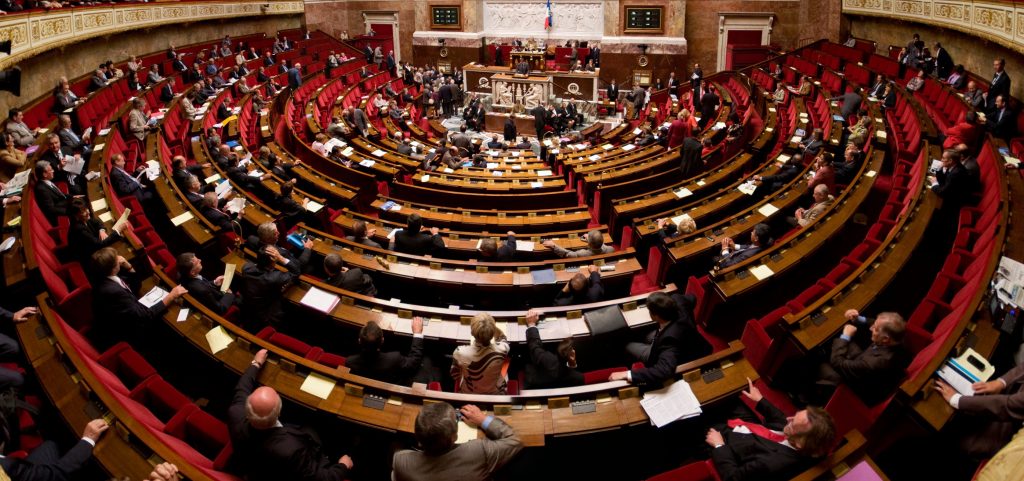
Many European countries do not have the institutional structure required to implement an ethical impact assessment procedure, and the few who have it use it focus on ethics in life sciences. There is a need to put the establishment of frameworks concerning research ethics and ethical impact assessment onto the political agenda. The case of France offers insights on motivations and processes of development of a national discussion on research ethics.
By Stéphanie Gauttier, University of Twente
Motivations for the establishment of a debate on research ethics
Indeed, France is rather a typical case when it comes to research ethics as most of the regulation and existing structures deal with ethics for life sciences. Nonetheless, policy-makers have started to debate research ethics in general and in specific fields over the last few years. An analysis of the documents available from the online repository of the French National Assembly helps identify some of the motivations that led to discussing ethics, such as:
- The need to follow European regulations and the Horizon 2020 program, which refers to both a political and economic rationale (i.e., avoiding sanctions, getting funding);
- The need to protect the reputation of France in the scientific field, especially after the revelation of cases of scientific misconduct in the media. This reputation can be seen as a competitive advantage to attract the best researchers, funding, and produce cutting-edge knowledge;
- The idea discussed by policy-makers that society needs to be able to rely on the results of science to comprehend the development of technology and upcoming societal and economic challenges linked to it.
French policy-makers do not really consider limiting research on new technologies as an option, as doing so would limit the competitive advantage of the country on the international scene. Rather, as stated in a 2016 resolution proposal, “research on sensitive topics should be conducted with integrity and the societal and economic consequences of research projects should be taken into account”. Preventing ethical and societal assessment would therefore be a failure. However, there does not seem to be any fundamental discussion on making these assessments mandatory.
Political actions undertaken to establish research ethics and integrity
Following this clear intent to consider the role of science in society, policy-makers have started to investigate research ethics from different perspectives:
- First, the National Assembly and in particular the Parliamentary office For Scientific and Technological Assessment (OPECST) has produced a series of reports that partly deal with the ethical, societal, and economic impact of the new technologies such as artificial intelligence or the Internet of Things, pushing the discussion on ethics beyond the realm of bioethics. Although these reports do not consider tools and approaches to guarantee ethical standards, they do hint at a certain readiness level from the members of parliament to hear and discuss ethics assessment approaches and regulations.
- Second, the government has consulted the academic sector: a report on scientific integrity was commissioned by the Ministry of Education and Research from Professor Corvol, a well-known scientist with a deep interest in ethics. The report lists 16 recommendations for the reinforcement of scientific integrity. Among these, the key recommendations relevant to SATORI include the establishment of deontological referents for researchers, the need for public funding organisations to condition grants to the existence of an ethics and integrity policy in beneficiary institutions, and the subsequent need to establish controls of the implementation of such policies. Another key recommendation is the establishment of a structure to oversee matters linked to scientific integrity in 2017.
- Third, different national institutions have initiated debates on ethics and technology, engaging with stakeholders and citizens. For instance, the National Commission on Informatics and Liberty is organising a series of events on the ethics of algorithms, calling for wide stakeholder engagement. The results of these events will be presented in the fall of 2017 to inform policy-making. The Commission for Reflexion on the Ethics of Research on Sciences and Digital Technologies of Allistene (CERNA) has also initiated a series of conferences dealing with the development of ethics of digital technologies, algorithms, and digital governance.
The need for international governance of research ethics in all fields
While France is considering these different recommendations at the national level, some MPs have called for the adoption of an international convention as what is at stake with technological developments cannot be contained within national borders. In particular, they stress that there is a need for something similar to the Oviedo Convention, but in a form that is applicable across academic disciplines, including social sciences. The SATORI CWA, designed with multi-disciplinarity in mind, might be a suitable basis for discussion.
What are the lessons for other countries?
We can identify four key insights from the above analysis:
- Conveying the importance of research ethics goes beyond a conversation on science: it is also a conversation about cultural, economic, societal, and political issues;
- Linking research ethics to the societal stakes of innovation opens the doors to the need for international agreements on the topic;
- The French case shows the significance of the role of scandals. Although these are not directly mentioned, the harm caused by misconduct is. Monitoring cases of ethical breaches and their discussion within society is needed to open the discussion at a timely moment;
- It is also possible to use what is on the agenda to talk about ethics in specific areas, as is the case for new digital technologies in France. Ongoing consultations or debates represent a window of opportunity to introduce research ethics frameworks beyond life sciences through personal engagement and dissemination of SATORI policy briefs.
